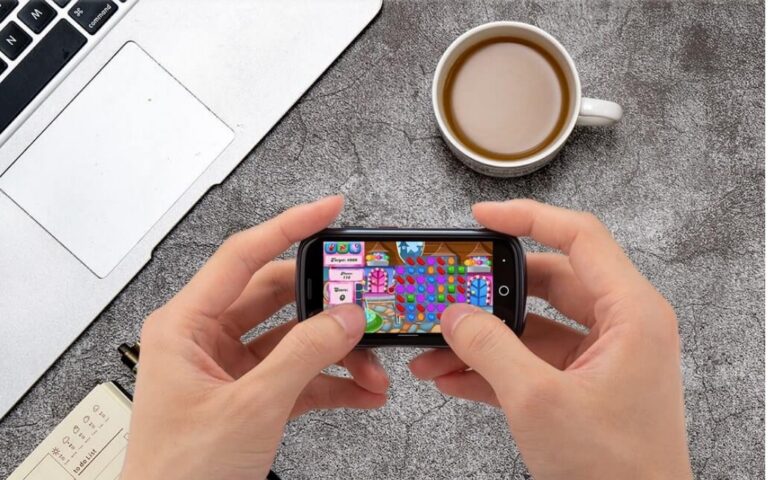Once upon a time, phones were less smart, less intelligent… but more fun. At least in looks, as they indulged in the design theme: washing machine-style exterior portholes, handles, screens that rotated in incredible ways, transparent keypads, Star Trek-style phones, physical QWERTY keyboards.
The world had been in the pocketbook race. From the first mobile phones that needed a bag to be carried, the goal had been achieved. Tiny, lightweight models that went with us everywhere.
Since then, needs have changed and, with all-touch smartphones, screens have become huge again. So much so that some today resemble large frying pans, with displays of almost 7 inches. Yet, somewhere, the little brothers still exist and are 100 per cent usable!
Here are the world’s smallest modern smartphones, all from the last three years, with no more than 5 inches of screen, and fully functional.
Table of Contents
In 2020, Rakuten Mini was released: low-end specs in 80 grams and 10 centimetres
In January 2020, before the pandemic revolution, a model called Rakuten Mini was only released in Japan. Before that time, the company had almost only been concerned with being a phone operator. Then it found a niche to throw itself into: there was someone who wanted small phones.
The Rakuten Mini was not to be trifled with on some parts of the spec sheet. Snapdragon 439, Android 9, IP52 certification. Sure, the 3 GB RAM and HD Ready screen (1280×720 pixels at 3.6 inches) put it at the low end. But not in a non-existent range.
But it did fit into its bracket, being born with a very low price tag of around 170 euros at the exchange rate. And it hit its niche. About 10 cm long and 5 cm wide (phones under 15×7 are now unobtainable), and a ridiculously low weight of only 79 grams. Today, 170 gram smartphones are called ‘light’, and many even exceed 200.
Was the Rakuten Mini a super phone? Certainly not. But it was very portable and, with the price at which it came out, it proved to be a viable alternative for those who demanded little from their smartphones. And, above all, demanded that they should not weigh too much. As opposed to the almost 7-inch giants of the moment.
Can toasters make smartphones? Balmuda Phone says yes
Balmuda is a company, also Japanese, that makes excellent, functional and cleanly and modernly designed household appliances. It would have nothing to do with smartphones if it were not for the fact that a year ago it launched its first mobile phone, the Balmuda Phone – and to call it iconic is an understatement.
“The main reason we recommend Balmuda Phone is its size,” says Balmuda’s website. Just 4.9 inches, with bezels thinner than the Rakuten Mini, accompanied by a super-curved back and the total absence of straight lines.
It oozes ‘design‘ from every pore: it looks like a piece of furniture, it is designed to be placed face down revealing the signature white back cover, the perfectly embedded cameras and the notification LED that changes colour depending on the settings. Its unique shape makes it fit harmoniously in the palm of our hand, and it weighs only 138 grams.
Balmuda also customised the operating system to fit the design, with gestures linked to its logo, widening and narrowing on system apps such as calendar and notes, and adaptable widgets. It has full mid-range 2021 features such as 6 / 128 GB RAM and storage. Also, a 48 MegaPixel rear cam, 5G and Android 11.
Of course, outside of that it is not a phone we would call quality/price. There is only one rear camera, and together with the front one it is far from excellent. The battery and screen are only decent. And above all, the launch price is top-of-the-line – around 800 Euros at the exchange rate. Sold more as a design object, but worthy of entering a collection like this, and still fully functional with Android 10.
Tiny and super-complete: Unihertz Jelly 2 is the perfect pocket smartphone
We would like to conclude this collection with the smallest but also most attainable of the set. A design that proves that smartphones of this kind can still exist and do not make any sacrifices in terms of functionality. The Unihertz Jelly 2 is indeed tiny, with a 3-inch net display – just 7.62 centimetres of screen. So much for the giant foldables of 2022, in short.
It is called Jelly because it looks like a gummy jelly in every way. The phone measures 10 centimetres long, 5 centimetres wide and 1.65 centimetres deep. With a somewhat nostalgic-looking raised and curved back. It is the ‘sequel’ to an even smaller previous phone (Unihertz Jelly) with a 2.45-inch display.
It came out in 2020 but the only disclaimer is on the display, which is indeed small (but for many it is a ‘pro’) and with a low resolution of 490×854 pixels. But the other features are still competitive today, two years after the launch, compared to the new releases. 6 GB RAM, 128 storage space, a very sufficient Mediatek Helio P60 processor, an impressive 2000 mAh battery for the size of the phone.
It’s surprising how they’ve squeezed in the headphone jack that so many are missing today and the semi-physical navigation buttons at the bottom. Also, NFC for card payments, the fingerprint sensor on the back, the physical SIM slot. And even a second little button on the side with which to set custom shortcuts.
Sure, you can’t expect wonders from the cameras or the speaker, and if you get a phone this small you almost have to ignore the display resolution. But overall, it is an almost microscopic smartphone that fits in a shirt pocket and does just about everything.
Read also: New Oppo A17, features and price of one of the cheapest and most complete smartphones on the market












